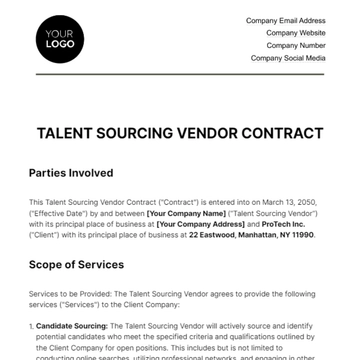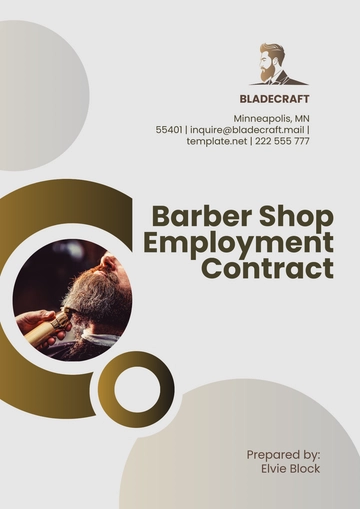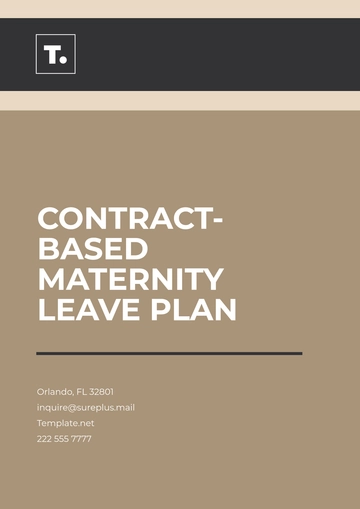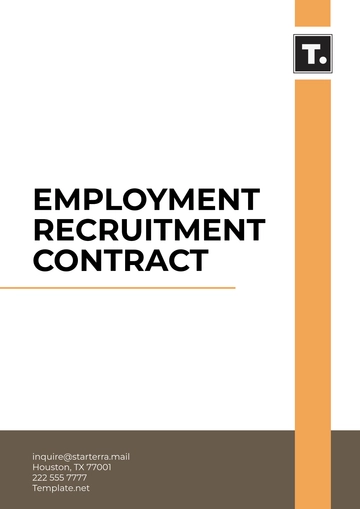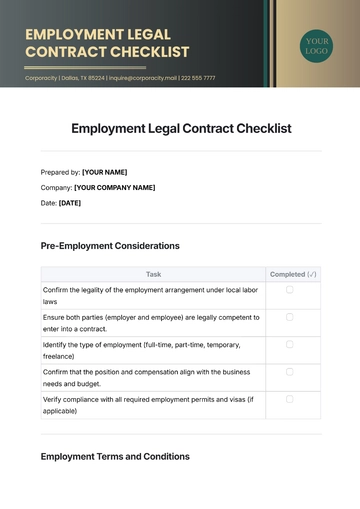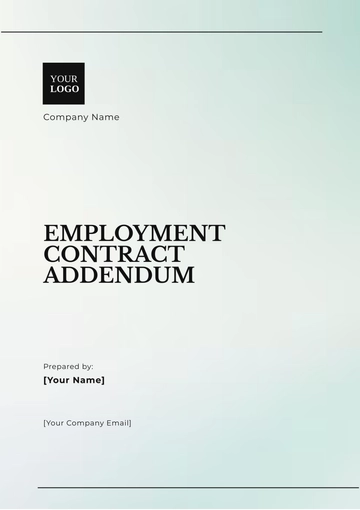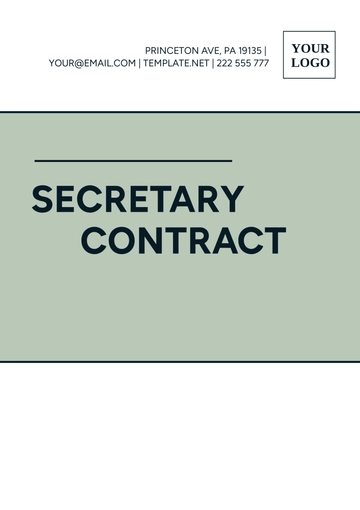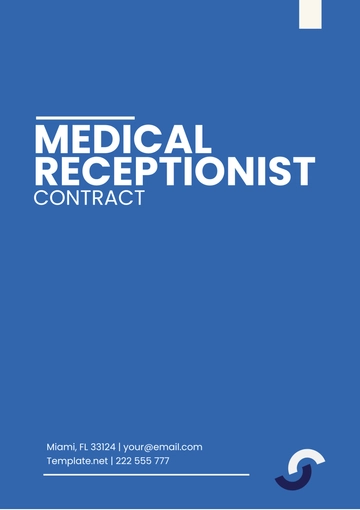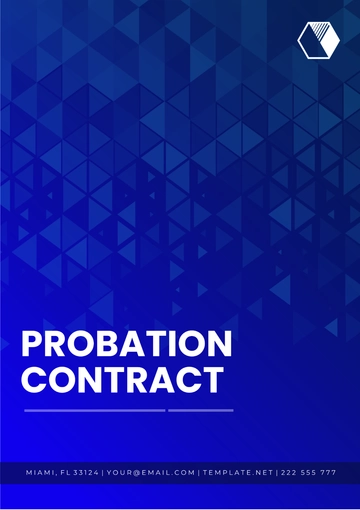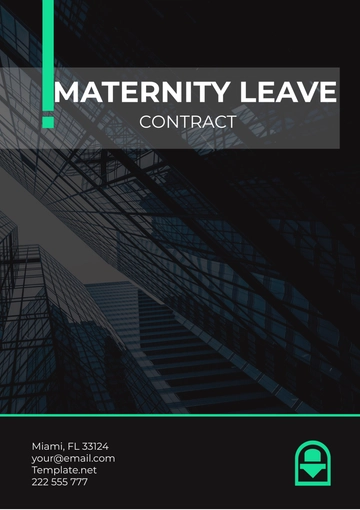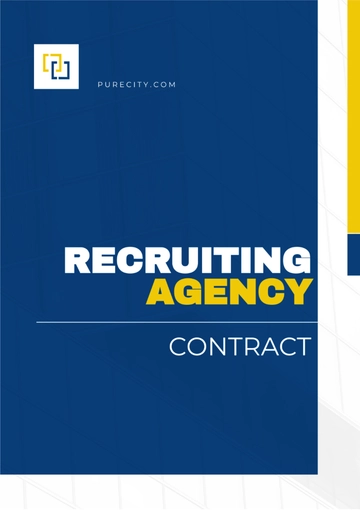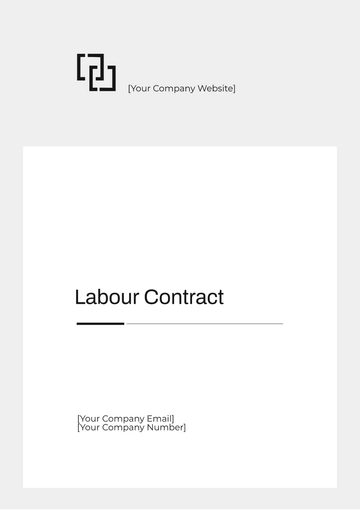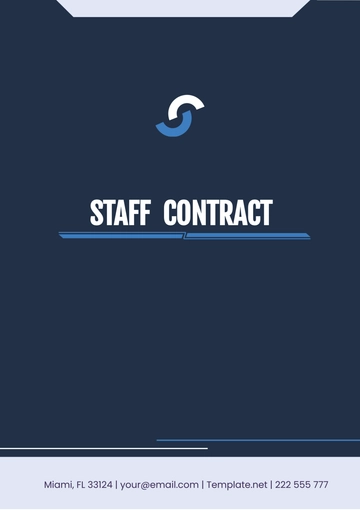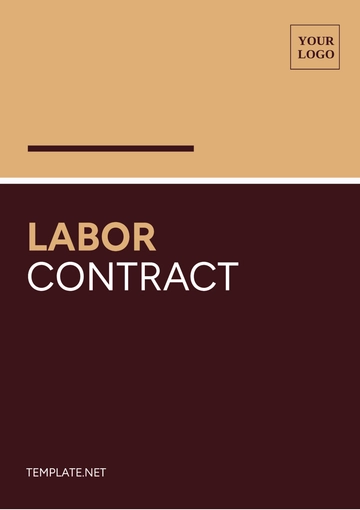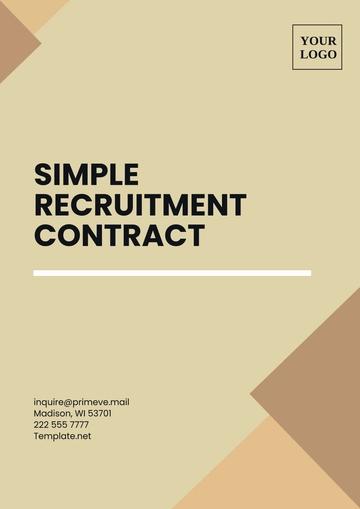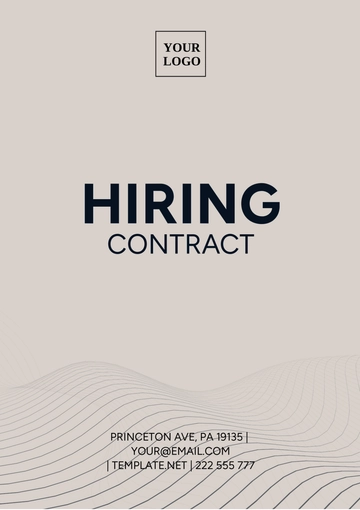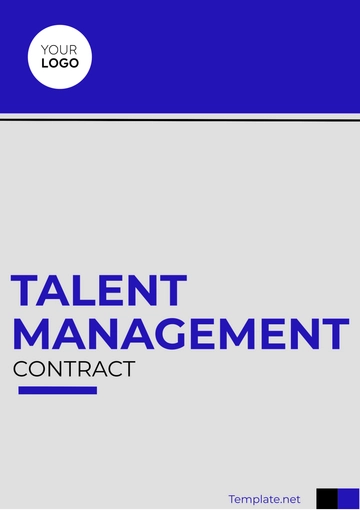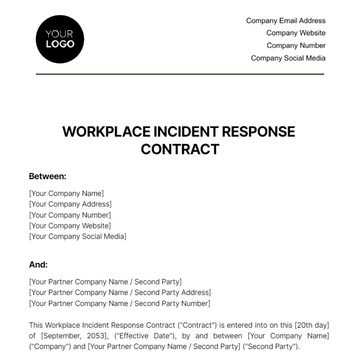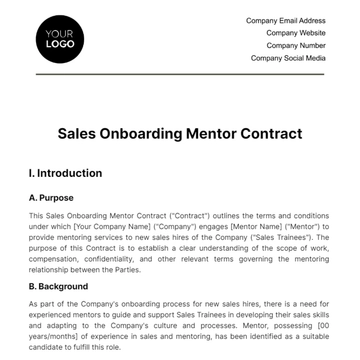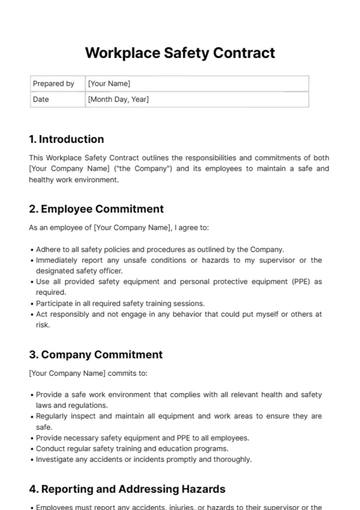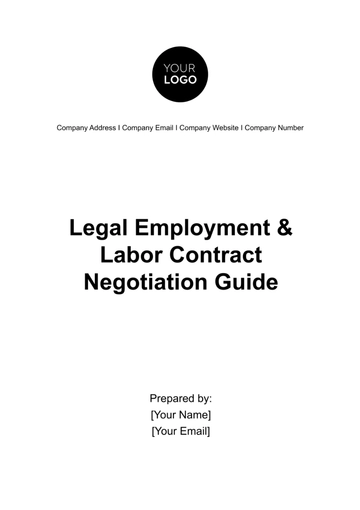Free Barber Shop Employment Contract
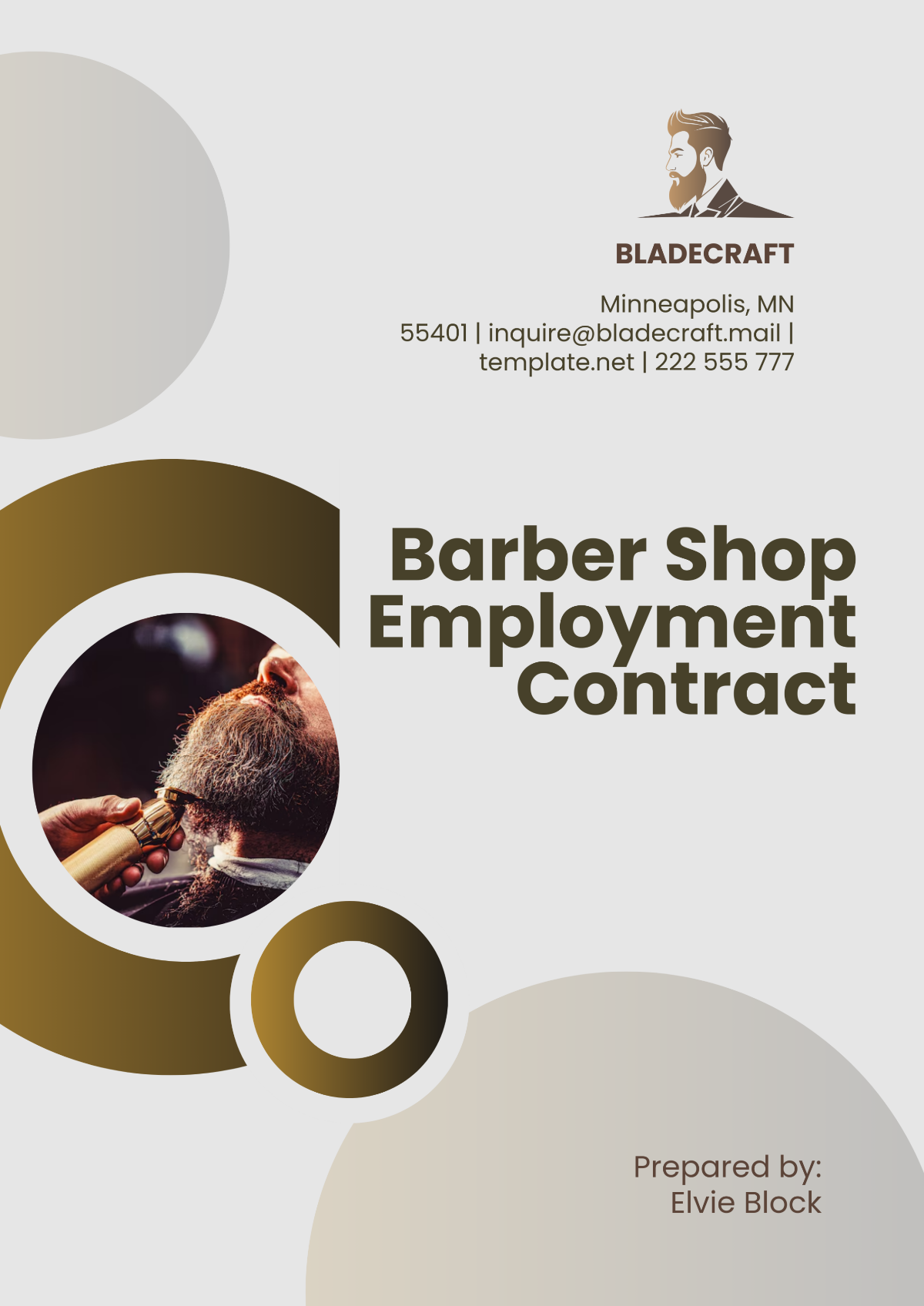
This Employment Contract is entered into this [1st] day of [January], [2050], by and between [Your Company Name], located at [Your Company Address] (“Employer”), and [Employee Name] (“Employee”). Both parties agree to the terms and conditions outlined in this contract. This contract will govern the terms of employment, outlining the mutual rights, obligations, and expectations of both parties.
I. General Provisions
A. Purpose
The purpose of this contract is to formally define the nature of the employment relationship between [Your Company Name] and the Employee. It serves to clarify the specific terms under which the Employee will perform their duties, as well as the rights and obligations of the Employer and the Employee. This document aims to ensure a clear understanding of mutual responsibilities and ensures that both parties have a shared vision and agreement on key matters, including work schedules, compensation, conduct expectations, and more.
This contract sets forth a transparent and mutual understanding of the Employee's role within the organization. Both the Employer and the Employee are expected to abide by the terms and guidelines to ensure a successful, productive, and professional relationship throughout the term of employment. By signing this contract, both parties acknowledge and accept these provisions.
B. Effective Date
This contract becomes effective as of 1st January 2050. From this date onward, the terms outlined in this agreement will govern the Employee's work at [Your Company Name]. Both parties agree that this contract will continue to be in force until either party terminates the relationship under the conditions specified herein. If at any point the contract is revised or amended, a new agreement will be presented and must be signed by both parties.
II. Position and Duties
A. Job Title
The Employee is hired as a Barber at [Your Company Name], with all the rights, responsibilities, and obligations that come with this position. The position requires the Employee to perform specific duties related to barbering, customer service, and other associated tasks as necessary. The Employee will report to the shop manager or another designated representative of the Employer and is expected to perform their duties with professionalism and high standards of service.
The job title of Barber is classified as a non-exempt position, meaning the Employee is entitled to receive overtime pay for hours worked beyond the standard workweek, in accordance with local labor laws. The Employee agrees to perform their duties as expected and to meet the performance standards set forth by the Employer.
B. Responsibilities
The Employee shall perform the following duties, as well as any additional tasks that may be reasonably assigned by the Employer:
Haircutting and Grooming Services
The Employee will be responsible for providing haircuts, beard trims, shaves, and other grooming services to clients. The services provided must meet the high standards set by [Your Company Name]. It is crucial that the Employee performs their duties efficiently, delivering services in a timely manner while maintaining a high level of craftsmanship and customer satisfaction.The Employee is expected to ensure that clients leave the shop feeling satisfied with their appearance. They are also encouraged to offer recommendations regarding hair care, style, and grooming to help foster customer loyalty.
Sanitation and Hygiene
The Employee must adhere to all cleanliness and sanitation requirements, as outlined by both local health regulations and the Employer’s guidelines. The Employee is responsible for ensuring that their work area, tools, and equipment are properly sanitized after each use to maintain a clean, safe, and hygienic environment. In addition, the Employee is expected to maintain personal hygiene and ensure that their uniform and appearance are always in line with the company’s standards.Regular cleaning of the station and the communal areas of the shop, such as the waiting area, restroom, and shared tools, will be part of the Employee’s duties. The Employee’s ability to maintain cleanliness and hygiene is an essential part of their role as it directly impacts the overall experience of clients and the reputation of [Your Company Name].
Sales and Product Knowledge
The Employee is encouraged to take an active role in selling grooming products that are available for purchase at [Your Company Name]. The Employee should possess a sound knowledge of the products on offer, including hair care, beard care, and styling products. It is essential that the Employee can confidently provide advice to clients on which products will best meet their needs.The Employee should be proactive in recommending products to clients during or after their service. They are also expected to stay up-to-date on new product arrivals and trends in the barbering industry, which could enhance their ability to make informed recommendations to clients. Training will be provided periodically to ensure that the Employee remains knowledgeable and can effectively sell products.
Customer Interaction
The Employee is expected to create a welcoming and friendly environment for clients. Excellent communication skills are vital for this role. The Employee will engage with clients to determine their needs, explain service options, and ensure they are comfortable throughout their visit. It is also important for the Employee to manage any customer complaints or concerns in a professional and empathetic manner.Building a rapport with clients is essential, and the Employee is encouraged to take the time to remember regular clients' preferences, which helps build customer loyalty and encourages repeat visits.
Other Duties as Assigned
The Employee understands that additional duties may be assigned by the Employer as necessary to ensure the smooth operation of the barber shop. These duties may include assisting with inventory management, supporting other staff members, and performing tasks related to the general upkeep and management of the facility. The Employee agrees to carry out these tasks as part of their role.
III. Terms of Employment
A. Type of Employment
The Employee is employed under the following arrangement:
Full-Time: Minimum [40] hours per week, with regular work shifts from Monday to Saturday.
The Employee’s work schedule will be determined by the Employer but will follow the general guidelines stated in the contract. Any changes to the schedule will be communicated with reasonable notice.
B. Work Schedule
Working Hours:
The Employee will be required to work from [9:00 AM] to [6:00 PM], Monday through Saturday. This includes serving clients, maintaining the cleanliness of the shop, and any other tasks assigned by the Employer. The exact schedule may vary depending on business needs, but the Employee will always be provided with notice if changes to their working hours are necessary.If the Employee is unable to work at the designated times due to sickness, personal emergencies, or other reasons, they must notify the Employer as early as possible to make appropriate arrangements.
Breaks:
The Employee is entitled to [30]-minute lunch breaks and two [15]-minute rest breaks per workday. Breaks will be scheduled to minimize disruption to client services and will follow the regulations set forth by local labor laws.
C. Probation Period
The first [90] days of employment shall be considered a probationary period. During this time, either the Employee or the Employer may terminate the contract with [7] days' written notice. During this probation period, the Employee’s performance will be closely monitored to ensure that the expectations and standards of [Your Company Name] are met. If the Employee fails to meet these standards or if their performance is not satisfactory, the Employer reserves the right to terminate the contract.
After successful completion of the probationary period, the Employee will become a permanent employee, and the terms of the contract will continue to be in effect unless modified.
IV. Compensation and Benefits
A. Salary
The Employee will receive a fixed monthly salary of $[3,000] for full-time employment. This amount will be paid twice a month on the [15th] and [30th] of each month. Part-time employees will be paid at a rate of $[20] per hour. Salaries will be paid via direct deposit unless otherwise agreed upon.
The salary is inclusive of all standard work hours, and any overtime worked will be compensated separately as outlined in Section IV.C: Overtime Compensation. The salary amount is subject to applicable tax deductions and withholdings.
B. Performance-Based Commission
In addition to the base salary, the Employee is eligible for performance-based commissions. These commissions are based on individual performance and are outlined as follows:
Product Sales Commission:
The Employee will receive [10%] of the value of products sold during their shifts. The Employee is expected to be proactive in promoting products to clients and will be rewarded for any sales made.Service Sales Commission:
The Employee is eligible to earn commissions for services rendered that exceed a monthly revenue quota of $[8,000]. For every dollar earned beyond this threshold, the Employee will receive a [5%] commission.
C. Benefits
Paid Leave
The Employee is entitled to [14] days of paid annual leave per year, which can be taken at a time mutually agreed upon with the Employer. Unused leave days may roll over into the following year, but a maximum of [7] days may be carried over.
The Employee is also entitled to [7] days of paid sick leave each year. Sick leave may only be taken with appropriate documentation, such as a doctor’s note.
Health Insurance
The Employer will cover [50%] of the Employee’s health insurance premium, while the Employee will be responsible for the remaining [50%]. This insurance package will cover medical, dental, and vision benefits. Further details on the health insurance options will be provided during onboarding.Employee Discounts
The Employee is entitled to a [20%] discount on products and services offered by [Your Company Name], which may be used for personal purchases or gifts. These discounts are not applicable to commissions or professional services.Professional Development
The Employer supports the continuous professional development of its employees. The Employee will have opportunities to attend barbering workshops, industry conferences, and other educational events sponsored by [Your Company Name]. The Employer will cover the costs of registration and transportation for approved events.
V. Code of Conduct
A. Professional Standards
The Employee is expected to adhere to professional standards at all times, including:
Maintaining a clean, neat, and professional appearance while on duty.
Using appropriate language and conduct while interacting with clients and other staff members.
Being respectful and courteous to clients, co-workers, and management.
The Employee should also be aware that maintaining high-quality standards of service is essential for the reputation of the company. Clients expect consistency, and it is the Employee's duty to ensure that each service meets the required standards of excellence.
B. Workplace Policies
The following workplace policies are to be followed by all employees:
Attendance and Punctuality
The Employee must report to work at least [15] minutes before their scheduled shift.
Repeated tardiness or unapproved absences may result in disciplinary action, including termination of employment.
Substance Use
The use of alcohol, drugs, or any illegal substances on company premises is strictly prohibited. Violation of this policy may result in immediate termination of employment.
Confidentiality
The Employee is expected to maintain the confidentiality of all client information, both during and after their employment with [Your Company Name]. Unauthorized sharing or disclosure of this information may result in legal consequences and termination of employment.
VI. Performance Evaluation
A. Regular Evaluations
The Employee's performance at [Your Company Name] will be assessed periodically to ensure that expectations are met and to identify any areas of improvement. Performance evaluations will occur at least every 6 months from the start of employment, though evaluations may be scheduled more frequently as required by the business or specific needs of the Employee. During these evaluations, both the Employer and the Employee will meet to discuss the Employee’s strengths, areas for growth, and overall contribution to the company.
The purpose of these evaluations is not only to review past performance but also to set clear goals for the future. The Employer will offer constructive feedback, ensuring the Employee is aware of how their performance aligns with [Your Company Name]'s goals. The Employee is encouraged to actively participate in these discussions, share any concerns they may have, and suggest areas where they feel additional training or resources are needed.
The performance evaluation will be based on several key performance indicators (KPIs), including:
Customer Satisfaction: The Employee's ability to consistently meet or exceed customer expectations.
Technical Skills: The Employee's proficiency in barbering techniques, product knowledge, and the ability to perform complex grooming services.
Sales Targets: The Employee’s contribution to reaching sales targets related to product recommendations and additional services.
Work Ethic and Punctuality: The Employee’s attendance, reliability, and general attitude toward their work.
This evaluation process helps to maintain a high standard of service and ensure that the Employee's professional growth is aligned with the needs of the company. Additionally, it is an opportunity for the Employee to voice any concerns or suggestions for improving their experience at [Your Company Name].
B. Feedback and Goals
Feedback provided during the performance evaluations is a crucial part of the Employee's development. The Employer will focus on both positive feedback, recognizing achievements and areas of excellence, and constructive criticism, highlighting areas where improvement is needed. The goals discussed will be measurable and achievable, allowing the Employee to track their progress.
Examples of goals that may be set during performance evaluations include:
Improving client retention rates: Establishing a personal connection with regular clients and ensuring they return for follow-up services.
Increasing product sales: Setting targets for product sales, such as aiming to sell a specific amount of grooming products each month.
Advanced technical skills: Encouraging the Employee to pursue further training in specialized haircuts or treatments, such as fades or beard sculpting.
By setting clear goals and tracking progress, [Your Company Name] ensures that both the Employer and Employee are aligned on expectations and aspirations, ultimately enhancing the Employee's performance and satisfaction.
VII. Use of Tools and Property
A. Tools and Equipment
As a Barber at [Your Company Name], the Employee will be provided with all necessary tools and equipment to perform their job effectively. This includes but is not limited to clippers, scissors, combs, razors, and any other equipment required to perform barbering services. The Employer will ensure that these tools are of high quality and maintained regularly to guarantee safety and efficiency.
It is the Employee's responsibility to ensure that the tools and equipment provided are used properly and handled with care. Any damages or malfunctions must be reported to the Employer immediately so that repairs or replacements can be arranged. The Employee is not permitted to use personal equipment for work purposes unless explicitly authorized by the Employer. In the event that personal equipment is used, it must meet the same standards of cleanliness and maintenance as company-issued equipment.
If the tools provided are damaged due to negligence or misuse, the Employee may be responsible for the cost of repairs or replacement. Regular cleaning and upkeep of all equipment are essential to maintaining a high standard of service and ensuring the safety of clients and staff.
B. Uniforms
The Employee is required to wear a professional uniform while performing their duties at [Your Company Name]. Uniforms are an essential part of the company's branding and are designed to present a cohesive and professional appearance to clients. The Employer will provide the Employee with [2] sets of uniforms at no cost, with the expectation that they will be worn during work hours.
The Employee is responsible for ensuring that the uniform is clean, in good condition, and well-maintained. If the uniform becomes damaged, the Employee should report it to the Employer for a replacement. The uniform must be returned at the end of employment in good condition. If the Employee fails to return the uniform or if it is damaged beyond reasonable wear and tear, the Employer reserves the right to deduct the replacement cost from the Employee's final paycheck.
The uniform policy is also a part of the Employee's commitment to maintaining a professional appearance. The Employee is expected to adhere to personal grooming standards, which may include specific hairstyles, facial hair grooming, and hygiene practices. This ensures that all staff members present themselves in a manner that reflects the high standards of [Your Company Name].
VIII. Termination of Employment
A. Grounds for Termination
Employment with [Your Company Name] is at-will, meaning either the Employer or the Employee may terminate the employment relationship at any time, with or without cause, provided that the conditions of the contract and local labor laws are adhered to. However, specific circumstances may lead to immediate or accelerated termination under the following conditions:
Voluntary Termination:
The Employee has the right to resign from their position at any time, provided they give [30] days' notice in writing. This notice period allows the Employer sufficient time to find a replacement or make necessary adjustments to staffing. Failure to provide the required notice may result in the Employee forfeiting certain benefits, such as unused paid time off, at the Employer's discretion.Termination for Cause:
The Employer may terminate the Employee immediately if there is a breach of any of the following:Violation of Company Policies: The Employee is found in violation of any of the Employer’s policies, including but not limited to the drug and alcohol policy, attendance policy, or conduct policy.
Gross Misconduct: This includes, but is not limited to, theft, harassment, insubordination, or any action that endangers the safety or wellbeing of clients or other employees.
Poor Performance: If the Employee consistently fails to meet the job expectations and performance standards outlined in the contract or during regular performance reviews.
Mutual Agreement:
In some cases, the Employer and Employee may agree to part ways amicably. This may occur when either party believes that the employment relationship is no longer beneficial or if both parties agree that the terms of the contract are no longer suitable.End of Employment:
If the Employee’s position becomes redundant or the business experiences financial hardship, the Employer may offer a severance package. The terms of such a package will be provided in writing.
B. Final Paycheck
Upon termination of employment, whether voluntary or involuntary, the Employee will receive a final paycheck. This paycheck will include any wages earned up to the termination date, including unused vacation days or paid time off (PTO), and any outstanding commissions. The final paycheck will be provided within [5] business days of the termination date, in accordance with local labor laws.
If applicable, any outstanding debts or company property owed by the Employee, such as tools, uniforms, or unpaid expenses, may be deducted from the final paycheck, provided these deductions are permitted by law.
IX. Dispute Resolution
A. Mediation
In the event of a dispute between the Employer and Employee, both parties agree to attempt to resolve the issue amicably through mediation before pursuing other legal remedies. Mediation is a voluntary and confidential process in which a neutral third party assists the parties in reaching a resolution that is acceptable to both sides. Mediation can help preserve the professional relationship and may be more cost-effective and efficient than other methods of dispute resolution.
The parties agree to select a mediator by mutual agreement. If the mediation does not result in a resolution, the parties can proceed to arbitration, as outlined in Section IX.B: Arbitration.
B. Arbitration
If the dispute remains unresolved after mediation, either party may request arbitration. Arbitration is a binding process in which an arbitrator—often an attorney or expert in the field—reviews the dispute and makes a final decision that both parties must accept. Arbitration may involve an in-person hearing or written submissions, depending on the circumstances and the nature of the dispute.
Both the Employer and Employee agree to submit to the arbitration process under the rules of Local Arbitration Organization, and agree that the arbitrator's decision will be final and legally binding. Arbitration will be conducted in the jurisdiction where [Your Company Name] operates unless otherwise agreed upon by both parties.
X. Governing Law
This agreement shall be governed by and construed in accordance with the laws of the state of [Your State]. Any legal proceedings arising from this contract shall be filed in the appropriate courts of [Your State]. Both the Employer and Employee agree that they will comply with all applicable local, state, and federal laws during the term of this contract.
In the event that a provision of this contract is found to be invalid or unenforceable, the remaining provisions will continue to be in full force and effect.
XI. Miscellaneous
A. Amendments
This contract may only be amended, modified, or supplemented in writing, and both the Employer and the Employee must agree to and sign any such amendments. No verbal agreements or understandings will be considered valid, and any changes must be documented and signed by both parties.
B. Severability
If any provision of this contract is deemed to be illegal, invalid, or unenforceable by a court of competent jurisdiction, such provision shall be stricken from the contract. However, the remainder of the contract will continue in full force and effect, and both parties will continue to be bound by all other provisions.
C. Entire Agreement
This document constitutes the entire agreement between the Employee and Employer and supersedes any prior written or verbal agreements or understandings. Any modifications to this agreement, as outlined above, will be reflected in a new written document signed by both parties.
Employee Acknowledgment
By signing below, the Employee acknowledges that they have read, understood, and agree to the terms outlined in this contract.
Employer
 [Your Name]
[Your Name]
Date: 2050-01-01
Employee
 [Employee Name]
[Employee Name]
Date: 2050-01-01
- 100% Customizable, free editor
- Access 1 Million+ Templates, photo’s & graphics
- Download or share as a template
- Click and replace photos, graphics, text, backgrounds
- Resize, crop, AI write & more
- Access advanced editor
Set clear expectations with the Barber Shop Employment Contract Template from Template.net. This editable and customizable template helps define terms of employment, compensation, and job responsibilities. Easily tailor it using the AI Editor Tool. Create your employment contract today!
You may also like
- Rental Contract
- Contractor Contract
- Contract Agreement
- One Page Contract
- School Contract
- Social Media Contract
- Service Contract
- Business Contract
- Restaurant Contract
- Marketing Contract
- Real Estate Contract
- IT Contract
- Cleaning Contract
- Property Contract
- Supplier Contract
- Partnership Contract
- Food Business Contract
- Construction Contract
- Employment Contract
- Investment Contract
- Project Contract
- Payment Contract
- Student Contract
- Travel Agency Contract
- Startup Contract
- Annual Maintenance Contract
- Employee Contract
- Gym Contract
- Event Planning Contract
- Personal Contract
- Nursing Home Contract
- Law Firm Contract
- Work from Home Contract
- Software Development Contract
- Maintenance Contract
- Music Contract
- Amendment Contract
- Band Contract
- DJ Contract
- University Contract
- Salon Contract
- Renovation Contract
- Photography Contract
- Lawn Care Contract
